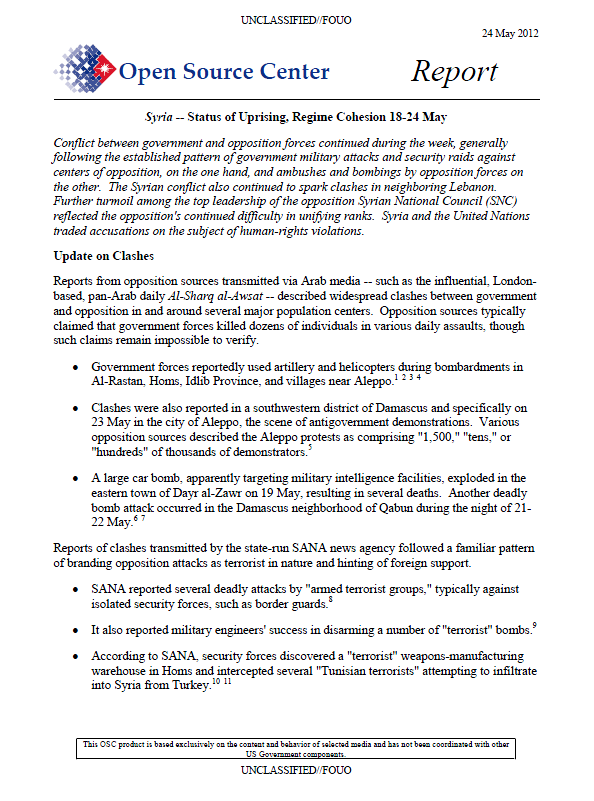The following document was originally published on Scribd by the Editor of the Grendel Report.
Open Source Center Report: Syria — Status of Uprising, Regime Cohesion 18-24 May
- 4 pages
- For Official Use Only
- May 24, 2012
Conflict between government and opposition forces continued during the week, generally following the established pattern of government military attacks and security raids against centers of opposition, on the one hand, and ambushes and bombings by opposition forces on the other. The Syrian conflict also continued to spark clashes in neighboring Lebanon. Further turmoil among the top leadership of the opposition Syrian National Council (SNC) reflected the opposition’s continued difficulty in unifying ranks. Syria and the United Nations traded accusations on the subject of human-rights violations.
Update on Clashes
Reports from opposition sources transmitted via Arab media — such as the influential, London-based, pan-Arab daily Al-Sharq al-Awsat — described widespread clashes between government and opposition in and around several major population centers. Opposition sources typically claimed that government forces killed dozens of individuals in various daily assaults, though such claims remain impossible to verify.
- Government forces reportedly used artillery and helicopters during bombardments in Al-Rastan, Homs, Idlib Province, and villages near Aleppo.
- Clashes were also reported in a southwestern district of Damascus and specifically on 23 May in the city of Aleppo, the scene of antigovernment demonstrations. Various opposition sources described the Aleppo protests as comprising “1,500,” “tens,” or “hundreds” of thousands of demonstrators.
- A large car bomb, apparently targeting military intelligence facilities, exploded in the eastern town of Dayr al-Zawr on 19 May, resulting in several deaths. Another deadly bomb attack occurred in the Damascus neighborhood of Qabun during the night of 21-22 May.
Reports of clashes transmitted by the state-run SANA news agency followed a familiar pattern of branding opposition attacks as terrorist in nature and hinting of foreign support.
- SANA reported several deadly attacks by “armed terrorist groups,” typically against isolated security forces, such as border guards.
- It also reported military engineers’ success in disarming a number of “terrorist” bombs.
- According to SANA, security forces discovered a “terrorist” weapons-manufacturing warehouse in Homs and intercepted several “Tunisian terrorists” attempting to infiltrate into Syria from Turkey.
More Clashes in Lebanon
Clashes between pro-Syrian Government and pro-Syrian opposition factions continued in
Lebanon, and a number of Lebanese Shiites were abducted in Syria under unclear
circumstances.
- Following a week of clashes in Tripoli between Sunnis hostile to the Syrian regime and Alawite regime supporters, fighting broke out in Beirut during the night of 21-22 May, reportedly resulting in two deaths.
- Ahmad Abd-al-Wahib, a Sunni cleric belonging to the pro-Syria 14 March alliance, was killed under disputed circumstances by Lebanese Army troops at a security checkpoint in northern Lebanon on 20 May.
- Approximately one dozen Lebanese Shiites, said to be pilgrims returning to Lebanon via Syria from Iran, were seized at gunpoint in Aleppo on 22 May. Family members and Syrian state media blamed the assault on the Free Syrian Army (FSA), but the FSA denied all responsibility and accused the Syrian Government of staging the incident.
Crisis Within SNC
The SNC formally accepted the resignation of Burhan Ghalyun, who had been reelected president on 15 May, and announced a new presidential election on 9-10 June. Ghalyun resigned under pressure from critics within the SNC who accused him of monopolizing power and failing to support properly the uprising.
Mutual Accusations Regarding Human-Rights Violations
In a report addressed to the UN Human Rights Council on 20 May, the Syrian Foreign and Expatriates Ministry charged that Syria is the victim of human-rights violations, both through “direct killing operations” by “armed terrorist groups” and through “the sanctions imposed by the countries, which are funding, backing, and hosting these groups.”
In a report released on 24 May, the UN’s Independent Commission of Inquiry on Syria charged that the Syrian Army and security services were responsible for most of the human-rights violations documented by the commission, both in the form of direct attacks against individuals and the “systematic denial” of food, water, and medical care.

